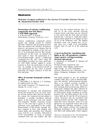TLDR Better education on proper hair cleansing methods is needed.
The study assessed hair care knowledge, attitudes, and practices among 100 dermatology patients, revealing that 65% used shampoos, which were preferred over soaps. Conditioners were less popular due to dryness concerns. Hard water use was linked to lower socioeconomic status, with 44% believing it caused dry hair. Weekly hair washing and natural substances like egg and hibiscus were common. The study emphasized the importance of dermatologists in advising on hair care, though it was limited by its small sample size.
51 citations
,
January 2014 in “International journal of trichology” Shampoo pH can affect hair health, with alkaline shampoos potentially causing damage and acidic shampoos reducing frizz.
 43 citations
,
January 2013 in “Indian Journal of Dermatology, Venereology and Leprology”
43 citations
,
January 2013 in “Indian Journal of Dermatology, Venereology and Leprology” The article concludes that advancements in hair cosmetics require dermatologists to stay informed about products and their potential risks, including allergies and higher risks for hairdressers.
 44 citations
,
January 2010 in “International journal of trichology”
44 citations
,
January 2010 in “International journal of trichology” Choosing the right shampoo for your hair type is crucial.
 11 citations
,
January 2006 in “International Journal of Cosmetic Science”
11 citations
,
January 2006 in “International Journal of Cosmetic Science” Some oils can penetrate hair and reduce the stickiness between fibers, but mineral oil cannot.
 December 2023 in “International Journal For Multidisciplinary Research”
December 2023 in “International Journal For Multidisciplinary Research” Indian medicinal plants can help with hair growth and common hair issues.
 2 citations
,
June 2020 in “Journal of Drug Delivery and Therapeutics”
2 citations
,
June 2020 in “Journal of Drug Delivery and Therapeutics” The document concludes that understanding hair problems can lead to cost-effective solutions and proper treatment choices.
 434 citations
,
October 2003 in “PTR. Phytotherapy research/Phytotherapy research”
434 citations
,
October 2003 in “PTR. Phytotherapy research/Phytotherapy research” Natural products in cosmetics are beneficial for skin and hair care with low toxicity.





